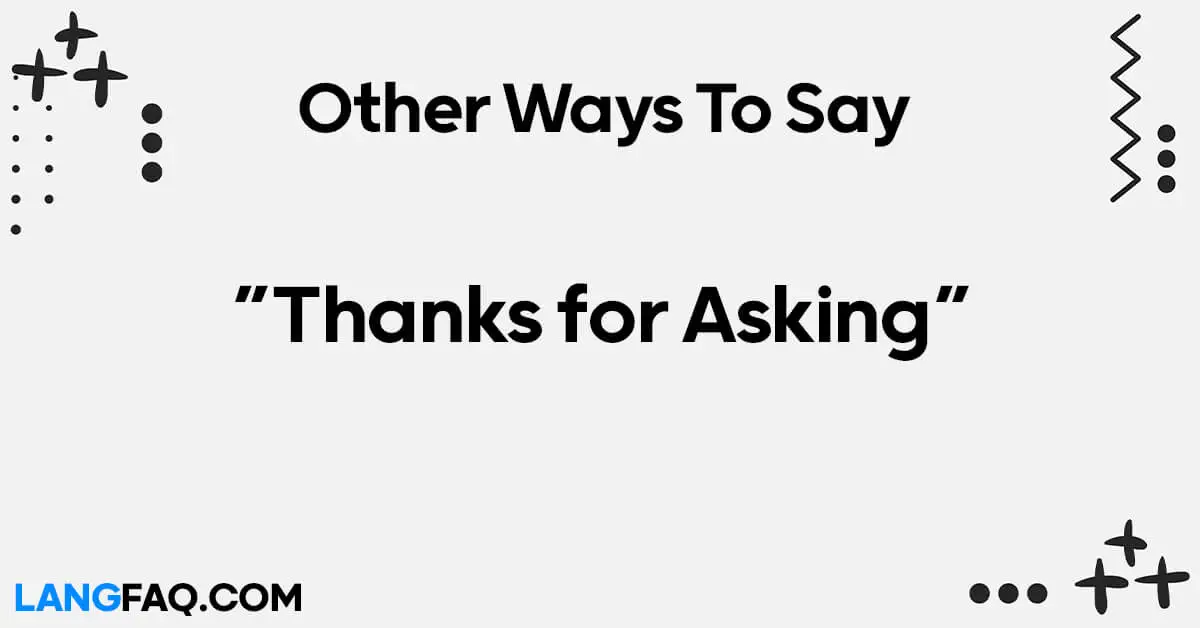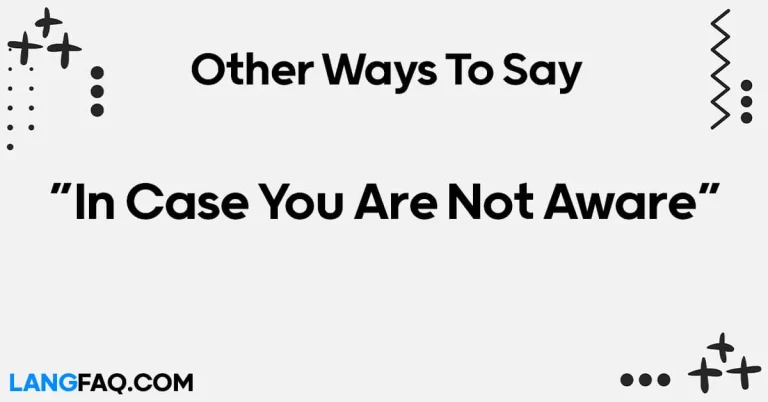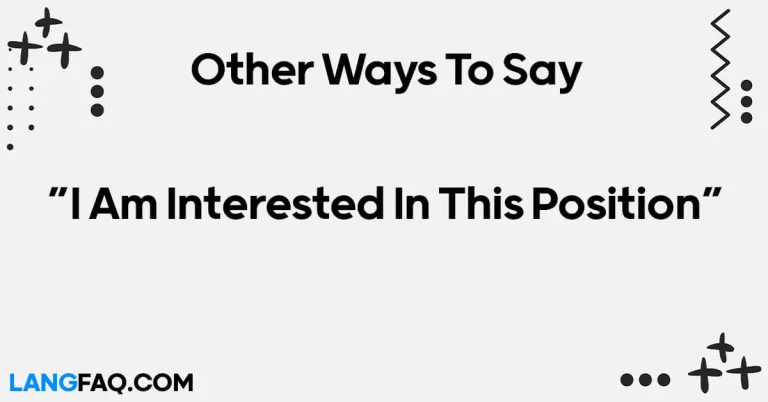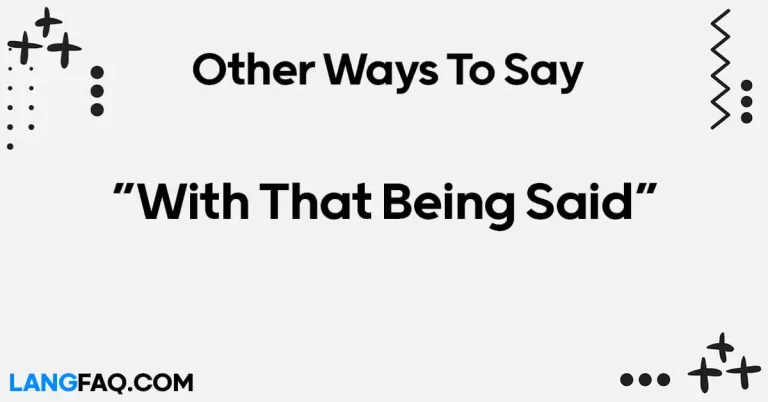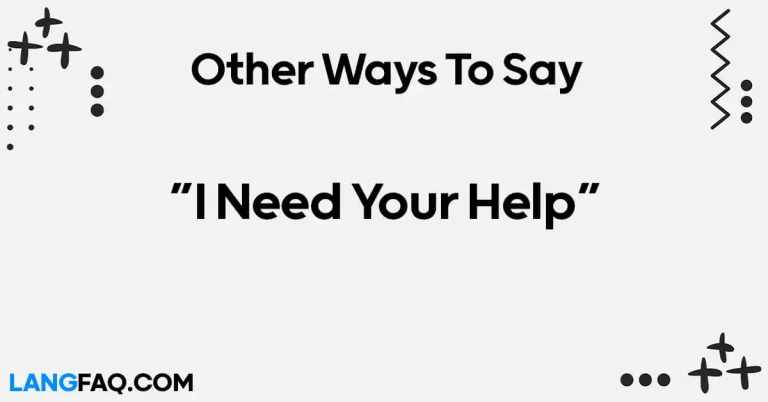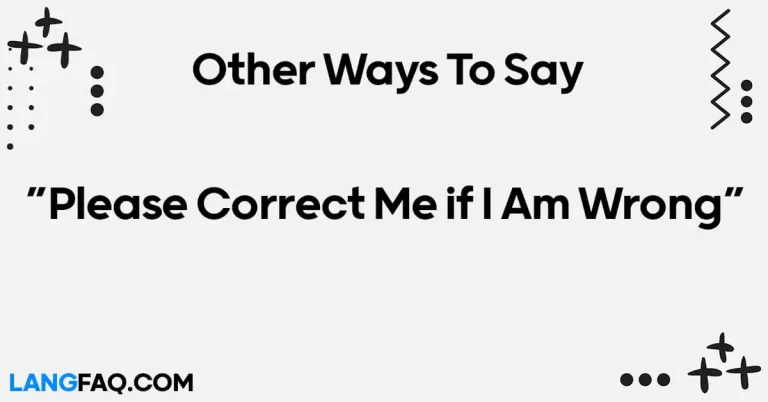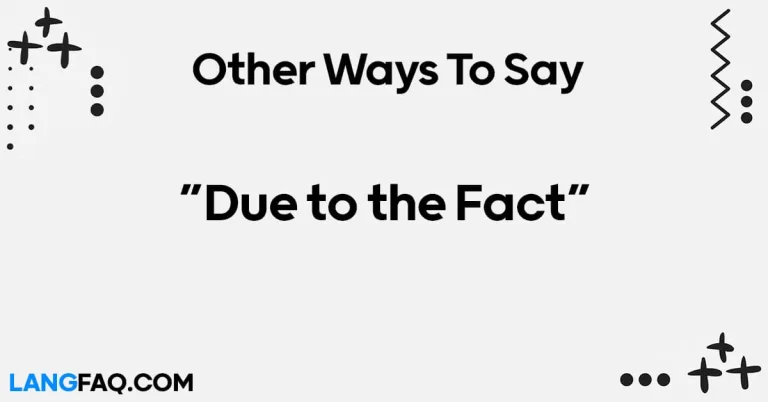Expressing gratitude is an art, and finding diverse ways to respond to the common question, “How are you?” adds richness to our interactions. In this article, we’ll delve into 12 other ways to say “Thanks for Asking,” providing you with an arsenal of expressions to elevate your communication. From casual to formal, discover unique ways to convey appreciation and engage meaningfully in diverse conversations.
12 Other Ways to Say “Thanks for Asking”
Here are 12 other ways to express gratitude when someone asks, “How are you?” or “Thanks for Asking”:
- I appreciate your inquiry.
- Your concern means a lot.
- Thanks for checking in on me.
- I’m grateful for your thoughtfulness.
- Your interest doesn’t go unnoticed.
- I’m touched by your consideration.
- Thanks for showing you care.
- Your question warms my heart.
- I value your kind inquiry.
- I’m thankful for your mindfulness.
- Your attentiveness is appreciated.
- Thanks for being genuinely caring.
| Expression | Meaning | Example |
|---|---|---|
| I appreciate your inquiry. | Conveying gratitude for the question. | “I appreciate your inquiry about my well-being.” |
| Your concern means a lot. | Expressing that the inquiry holds significant value. | “Your concern means a lot to me. Thank you.” |
| Thanks for checking in on me. | Acknowledging the act of checking on one’s well-being. | “Thanks for checking in on me; I appreciate it.” |
| I’m grateful for your thoughtfulness. | Conveying appreciation for the considerate question. | “I’m grateful for your thoughtfulness in asking.” |
| Your interest doesn’t go unnoticed. | Recognizing and appreciating someone’s curiosity. | “Your interest doesn’t go unnoticed; thank you.” |
| I’m touched by your consideration. | Expressing emotional impact from their thoughtful question. | “I’m touched by your consideration; it means a lot.” |
| Thanks for showing you care. | Appreciating the care reflected in the question. | “Thanks for showing you care by asking about me.” |
| Your question warms my heart. | Conveying a heartwarming feeling from their inquiry. | “Your question warms my heart; it’s truly comforting.” |
| I value your kind inquiry. | Recognizing and placing value on their kind question. | “I value your kind inquiry about my well-being.” |
| I’m thankful for your mindfulness. | Expressing gratitude for their mindful inquiry. | “I’m thankful for your mindfulness in asking.” |
| Your attentiveness is appreciated. | Acknowledging and appreciating their attentiveness. | “Your attentiveness is appreciated; thanks for asking.” |
| Thanks for being genuinely caring. | Expressing gratitude for their genuine care. | “Thanks for being genuinely caring; it means a lot.” |
These expressions offer a diverse range of ways to convey gratitude when someone asks about your well-being. Whether appreciating thoughtfulness, recognizing care, or expressing thanks for attentiveness, these phrases add depth and warmth to your responses. Choose the one that resonates most with the situation, fostering meaningful connections in your conversations.
Is It Correct to Say “Thanks for Asking”?
Yes, it is entirely correct to say “Thanks for Asking.” This phrase is a polite and appreciative response when someone takes the time to inquire about your well-being or shows genuine interest in your life. It reflects gratitude for the consideration and thoughtfulness of the person asking the question.
Using “Thanks for Asking” is a courteous way to acknowledge someone’s concern or curiosity, and it adds a positive and appreciative tone to the conversation. This phrase is commonly used in both formal and informal settings, making it a versatile expression to convey your thanks.
Professional Mail Example With “Thanks for Asking”
Subject: Appreciation for Your Inquiry
Dear [Recipient’s Name],
I hope this email finds you well. I wanted to express my gratitude for your recent inquiry about [specific topic or well-being].
Thanks for asking, and I appreciate your genuine interest in [the subject]. Your thoughtful question reflects the kind of collaborative and considerate atmosphere we value in our [workplace/team/organization].
I am pleased to share that [provide a brief update or response to the inquiry]. Your attentiveness and engagement in [the topic] contribute positively to our collective efforts.
If you have any further questions or if there’s anything else you’d like to discuss, feel free to let me know.
Thanks again for your inquiry. Looking forward to our continued collaboration.
Best regards,
[Your Full Name] [Your Position] [Your Contact Information]
1. Grateful for Your Inquiry
Expressing gratitude is an essential aspect of human interaction, and responding with “I appreciate your inquiry” is a sophisticated way to convey your thanks. This phrase is versatile, suitable for both formal and informal settings, making it an excellent choice in various contexts.
Explanation:
This expression is ideal in professional environments, such as workplaces or formal emails, where maintaining a level of formality is crucial. It reflects a sense of professionalism while appreciating the other person’s courtesy.
Scenario:
In a workplace setting, responding to a colleague’s inquiry about your well-being can be done with, “I appreciate your inquiry, John. All is well, thank you.” This maintains a level of professionalism while acknowledging the colleague’s consideration.
Example Sentence:
In a fast-paced corporate environment, expressing gratitude is paramount. “I appreciate your inquiry” adds a touch of formality to your response.
Email Sample:
Subject: Appreciation for Your Inquiry
Dear [Colleague’s Name],
I wanted to express my gratitude for your recent inquiry about my well-being. I appreciate your thoughtfulness and wanted to reassure you that all is well on my end. Thank you for your consideration.
Best regards, [Your Name]
Variations:
- Colleagues: “I appreciate your inquiry, [Colleague’s Name].”
- Friends: “Thanks for checking in, [Friend’s Name].”
- Mentor-Mentee: “I appreciate your guidance and concern, [Mentor’s Name].”
2. I Appreciate Your Interest
When someone goes beyond a mere greeting and shows genuine interest in your life, responding with “I appreciate your interest” is a powerful way to convey gratitude. This phrase adds a personal touch to your acknowledgment, suitable for various relationships.
Explanation:
This expression works well in both professional and personal relationships, emphasizing the depth of connection with the person who asked. It signals that their interest is not taken for granted.
Scenario:
In a friendly context, when a friend asks about your day, responding with, “I appreciate your interest, Sarah. It’s been quite eventful!” conveys warmth and gratitude for their curiosity.
Example Sentence:
Acknowledging genuine interest is essential. “I appreciate your interest” goes beyond a standard response, expressing genuine gratitude for someone’s curiosity.
Email Sample:
Subject: Thank You for Your Interest
Dear [Friend’s Name],
I wanted to drop you a quick note to express my gratitude for your genuine interest in my life. It truly means a lot, and I appreciate the depth of our friendship.
Best regards, [Your Name]
Variations:
- Colleagues: “I appreciate your interest, [Colleague’s Name].”
- Family: “Thanks for asking, [Family Member’s Name]. I appreciate your interest in my well-being.”
- Mentor-Mentee: “I appreciate your interest in my progress, [Mentor’s Name].”
3. Thanks, It Means a Lot
Adding a touch of depth to your gratitude, “Thanks, It Means a Lot” communicates that the inquiry holds significant value for you. This phrase works well in both formal and informal situations, allowing you to express genuine thanks.
Explanation:
This expression conveys a sense of sincerity, making it suitable for a variety of contexts. It goes beyond a standard “thank you” and emphasizes the impact of the inquiry.
Scenario:
In a professional setting, when a manager asks about your workload, responding with, “Thanks, it means a lot, especially during busy times,” communicates your appreciation for their understanding.
Example Sentence:
Expressing the significance of someone’s inquiry is crucial. “Thanks, It Means a Lot” adds sincerity to your gratitude, making it more impactful.
Email Sample:
Subject: Appreciation for Your Inquiry
Dear [Manager’s Name],
I wanted to express my gratitude for your recent inquiry about my workload. Thanks, it means a lot, especially during these busy times. Your understanding is truly appreciated.
Best regards, [Your Name]
Variations:
- Colleagues: “Thanks, it means a lot, [Colleague’s Name].”
- Friends: “I appreciate your concern, [Friend’s Name]. Thanks, it means a lot.”
- Mentor-Mentee: “Thanks for asking, [Mentor’s Name]. Your guidance means a lot to me.”
4. Your Kind Inquiry Warms My Heart
When you want to express a deeper level of appreciation, “Your Kind Inquiry Warms My Heart” is a wonderful choice. This phrase adds an emotional touch to your response, suitable for both personal and professional relationships.
Explanation:
This expression is particularly powerful in situations where the inquiry has a heartfelt impact. It conveys a sense of warmth and gratitude, making the interaction more meaningful.
Scenario:
In a mentor-mentee relationship, when your mentor asks about your progress, responding with, “Your kind inquiry warms my heart; I truly value your guidance,” expresses gratitude and acknowledges the emotional connection.
Example Sentence:
Acknowledging the emotional impact of an inquiry is significant. “Your Kind Inquiry Warms My Heart” adds a personal touch, making the interaction more meaningful.
Email Sample:
Subject: Grateful for Your Support
Dear [Mentor’s Name],
Your recent inquiry about my progress genuinely touched me. Your kind inquiry warms my heart, and I wanted to express my deep gratitude for your ongoing support and guidance.
Warm regards, [Your Name]
Variations:
- Colleagues: “Your kind inquiry warms my heart, [Colleague’s Name].”
- Friends: “I’m touched by your concern, [Friend’s Name]. Your kind inquiry warms my heart.”
- Family: “Your kind inquiry means a lot, [Family Member’s Name]. It warms my heart to know you care.”
5. I’m Touched by Your Thoughtfulness
Expressing gratitude with depth, “I’m Touched by Your Thoughtfulness” is a versatile phrase suitable for various relationships. This choice emphasizes the genuine consideration behind the inquiry.
Explanation:
This expression highlights the thoughtful nature of the person asking, acknowledging their effort to show care. It’s appropriate in both formal and informal settings, adding a personal touch to your response.
Scenario:
In a professional context, when a colleague asks about your workload, responding with, “I’m touched by your thoughtfulness; your consideration means a lot,” recognizes and appreciates their caring nature.
Example Sentence:
Recognizing and appreciating thoughtfulness is essential. “I’m Touched by Your Thoughtfulness” adds depth to your gratitude, emphasizing the genuine consideration behind the inquiry.
Email Sample:
Subject: Appreciation for Your Consideration
Dear [Colleague’s Name],
Your recent inquiry about my workload didn’t go unnoticed. I’m touched by your thoughtfulness, and I wanted to express my gratitude for your consideration and support.
Best regards, [Your Name]
Variations:
- Friends: “Your thoughtfulness means a lot, [Friend’s Name]. I’m truly touched by your concern.”
- Family: “I’m touched by your thoughtfulness, [Family Member’s Name]. Your consideration warms my heart.”
- Mentor-Mentee: “I’m touched by your thoughtfulness, [Mentor’s Name]. Your guidance means a lot to me.”
6. You Brightened My Day with Your Question
Adding a cheerful and positive tone to your response, “You Brightened My Day with Your Question” acknowledges the joy someone’s inquiry brings. This phrase is perfect for informal contexts, where you want to express happiness and appreciation.
Explanation:
This expression conveys not just gratitude but also the positive impact of the inquiry. It’s suitable for situations where you want to bring a lighthearted and joyful atmosphere to the conversation.
Scenario:
When a friend asks about your weekend plans, responding with, “You brightened my day with your question! I’m looking forward to some relaxation,” adds a positive spin and conveys appreciation for their interest.
Example Sentence:
Injecting positivity into your response is delightful. “You Brightened My Day with Your Question” adds a joyful tone, expressing the positive impact of the inquiry.
Email Sample:
Subject: Your Question Made My Day
Hey [Friend’s Name],
Your question about my weekend plans truly brightened my day! I appreciate your interest, and I’m looking forward to some well-deserved relaxation. Thanks for bringing a smile to my face!
Cheers, [Your Name]
Variations:
- Colleagues: “Your question brightened my day, [Colleague’s Name]. It’s always nice to share plans with you.”
- Family: “You always brighten my day with your questions, [Family Member’s Name]. Thanks for asking about my weekend.”
- Mentor-Mentee: “Your question made my day, [Mentor’s Name]. I appreciate your positive energy.”
7. It’s Uplifting to Be Asked by Someone Like You
Highlighting the positive impact of the question, “It’s Uplifting to Be Asked by Someone Like You” adds a layer of appreciation for the person asking. This phrase is suitable for both formal and informal situations, expressing gratitude with elegance.
Explanation:
This expression acknowledges not only the question but also the uplifting feeling it brings. It’s perfect for situations where you want to convey the positive influence of the person’s inquiry.
Scenario:
In a professional setting, when a colleague asks about your project progress, responding with, “It’s uplifting to be asked by someone like you; I appreciate your interest in my work,” adds a touch of professionalism while expressing gratitude.
Example Sentence:
Recognizing the uplifting feeling is essential. “It’s Uplifting to Be Asked by Someone Like You” adds elegance to your response, highlighting the positive impact of the inquiry.
Email Sample:
Subject: Appreciation for Your Inquiry
Dear [Colleague’s Name],
Your recent inquiry about my project progress has been truly uplifting. I appreciate your interest and am grateful to be working alongside someone like you. Thank you for your continual support.
Best regards, [Your Name]
Variations:
- Friends: “It’s always uplifting to be asked by you, [Friend’s Name]. Thanks for your genuine interest.”
- Family: “Your inquiries are always uplifting, [Family Member’s Name]. I appreciate your positive energy.”
- Mentor-Mentee: “It’s uplifting to be asked by someone like you, [Mentor’s Name]. Your guidance means a lot to me.”
8. Your Inquiry Shows Your Thoughtfulness
Acknowledging thoughtfulness is crucial, and expressing it with “Your Inquiry Shows Your Thoughtfulness” is a gracious way to convey gratitude. This phrase suits various settings, from professional to personal, where recognizing someone’s consideration is essential.
Explanation:
This expression emphasizes the considerate nature of the person asking, appreciating the effort put into the inquiry. It’s suitable for situations where thoughtfulness is a key aspect of the interaction.
Scenario:
In a professional email, when a colleague inquires about your availability for a meeting, responding with, “Your inquiry shows your thoughtfulness; I appreciate you considering my schedule,” maintains professionalism while expressing thanks.
Example Sentence:
Emphasizing someone’s thoughtfulness is impactful. “Your Inquiry Shows Your Thoughtfulness” appreciates the effort behind the inquiry, making the interaction more meaningful.
Email Sample:
Subject: Appreciation for Your Consideration
Dear [Colleague’s Name],
Your recent inquiry about my availability for the upcoming meeting did not go unnoticed. Your inquiry shows your thoughtfulness, and I appreciate you considering my schedule. Thank you for your consideration.
Best regards, [Your Name]
Variations:
- Friends: “Your inquiry always shows your thoughtfulness, [Friend’s Name]. I appreciate your consideration.”
- Family: “I’m grateful for your thoughtfulness, [Family Member’s Name]. Your inquiries show your caring nature.”
- Mentor-Mentee: “Your inquiry shows your thoughtfulness, [Mentor’s Name]. I appreciate your consideration and guidance.”
9. I’m Thankful for Your Consideration
When someone goes the extra mile to consider your feelings or schedule, expressing thanks with “I’m Thankful for Your Consideration” is a respectful and formal way to convey gratitude. This phrase is suitable for professional and personal relationships.
Explanation:
This expression directly conveys gratitude for someone’s consideration. It’s apt for scenarios where the person asking has taken extra steps to be thoughtful.
Scenario:
In a business setting, when a client inquires about your company’s policies, responding with, “I’m thankful for your consideration in asking about our policies; your diligence is appreciated,” expresses gratitude for their thoroughness.
Example Sentence:
Acknowledging someone’s consideration is key. “I’m Thankful for Your Consideration” directly appreciates the effort put into the inquiry, making the interaction respectful and formal.
Email Sample:
Subject: Appreciation for Your Inquiry
Dear [Client’s Name],
I wanted to express my gratitude for your recent inquiry about our company policies. I’m thankful for your consideration in seeking comprehensive information. Your diligence is greatly appreciated.
Best regards, [Your Name]
Variations:
- Friends: “I’m thankful for your consideration, [Friend’s Name]. Your questions always show your thoughtfulness.”
- Family: “Your consideration means a lot, [Family Member’s Name]. I’m thankful for your thoughtfulness.”
- Mentor-Mentee: “I’m thankful for your consideration, [Mentor’s Name]. Your guidance is invaluable.”
10. Thanks for Being Attentive to Others
Expressing gratitude for someone’s attentiveness is not only appreciative but also encourages positive behavior. “Thanks for Being Attentive to Others” is a versatile phrase suitable for various relationships where recognition of someone’s considerate nature is essential.
Explanation:
This expression not only appreciates the individual’s attentiveness but also encourages this positive behavior. It’s fitting for situations where acknowledging someone’s thoughtful actions is important.
Scenario:
In a team meeting, when a colleague asks about the progress of a shared project, responding with, “Thanks for being attentive to others; your engagement in our projects is invaluable,” recognizes their commitment and encourages continued active participation.
Example Sentence:
Encouraging attentiveness is crucial. “Thanks for Being Attentive to Others” not only appreciates the individual but also fosters positive behavior within the team.
Email Sample:
Subject: Appreciation for Your Engagement
Dear [Colleague’s Name],
I wanted to express my gratitude for your recent inquiry about our project progress. Thanks for being attentive to others; your engagement in our projects is truly invaluable. Let’s continue working collaboratively.
Best regards, [Your Name]
Variations:
- Friends: “Thanks for being attentive, [Friend’s Name]. Your thoughtful questions always make our conversations richer.”
- Family: “Your attentiveness doesn’t go unnoticed, [Family Member’s Name]. Thanks for being so considerate in our family discussions.”
- Mentor-Mentee: “Thanks for being attentive to my progress, [Mentor’s Name]. Your guidance is appreciated.”
11. You’ve Made My Day with Your Inquiry
Infusing positivity into your response, “You’ve Made My Day with Your Inquiry” expresses the joy someone’s question brings. This phrase is perfect for informal settings, adding a cheerful and appreciative tone to your gratitude.
Explanation:
This expression conveys the immediate positive impact of the inquiry, making it suitable for situations where you want to share the joy their question brought.
Scenario:
In a casual conversation with a friend who asks about your weekend plans, responding with, “You’ve made my day with your inquiry! I’m excited to share my weekend adventures,” spreads positive vibes and appreciation.
Example Sentence:
Sharing the joy their question brings is delightful. “You’ve Made My Day with Your Inquiry” adds a cheerful tone, expressing the immediate positive impact of the inquiry.
Email Sample:
Subject: You Made My Day!
Hey [Friend’s Name],
Your question about my weekend plans instantly made my day! I appreciate your interest, and I’m excited to share my weekend adventures with you.
Cheers, [Your Name]
Variations:
- Colleagues: “You’ve made my day with your inquiry, [Colleague’s Name]. Let me update you on our team’s progress.”
- Family: “Your inquiries always make my day, [Family Member’s Name]. Thanks for spreading positivity in our conversations.”
- Mentor-Mentee: “You’ve made my day with your inquiry, [Mentor’s Name]. Your interest is motivating.”
12. Appreciate Your Genuine Care
When you want to express thanks for someone’s genuine concern, “Appreciate Your Genuine Care” is a sincere and heartfelt way to convey gratitude. This phrase is suitable for both personal and professional relationships, emphasizing the authenticity of the person’s care.
Explanation:
This expression acknowledges the authenticity and sincerity behind the inquiry, making it fitting for situations where you want to convey deep appreciation for someone’s genuine care.
Scenario:
In a mentor-mentee relationship, when your mentor asks about your well-being, responding with, “I appreciate your genuine care; your concern means a lot to me,” emphasizes the depth of your gratitude and the value you place on their sincere interest.
Example Sentence:
Recognizing and appreciating genuine care is essential. “Appreciate Your Genuine Care” conveys heartfelt thanks, emphasizing the sincerity behind the inquiry.
Email Sample:
Subject: Grateful for Your Genuine Care
Dear [Mentor’s Name],
Your recent inquiry about my well-being touched me deeply. I appreciate your genuine care, and your concern means a lot to me. Thank you for being a supportive mentor.
Warm regards, [Your Name]
Variations:
- Colleagues: “I appreciate your genuine care, [Colleague’s Name]. Your thoughtful questions make our work environment more supportive.”
- Friends: “Thanks for your genuine care, [Friend’s Name]. Your concern always brightens my day.”
- Family: “Your genuine care is invaluable, [Family Member’s Name]. I appreciate your heartfelt inquiries.”
FAQs
Q: Are these phrases suitable for formal settings? Yes, these expressions range from casual to formal, allowing you to choose based on the context of the conversation.
Q: Can I use these responses in professional emails? Certainly! These phrases can add a touch of personality to your professional correspondence while maintaining a respectful tone.
Q: How do I decide which response to use? Consider the tone of the conversation and your relationship with the person. Choose a response that aligns with the context and your comfort level.
Q: Are these alternatives region-specific? No, these phrases are versatile and can be used in various English-speaking regions.
Q: Can I mix and match these responses? Absolutely! Feel free to customize your expressions based on the situation and your personal style.
Q: Do these phrases work for both positive and challenging situations? While some phrases lean towards positivity, others maintain neutrality, making them adaptable to different situations.
Conclusion
In conclusion, expressing gratitude doesn’t have to be mundane. By incorporating these 12 other ways to say “Thanks for Asking,” you can infuse freshness into your daily conversations. Whether you choose a formal acknowledgment or a lighthearted response, the key is to convey genuine appreciation. Elevate your communication skills, foster connections, and make every interaction memorable with these creative expressions.

